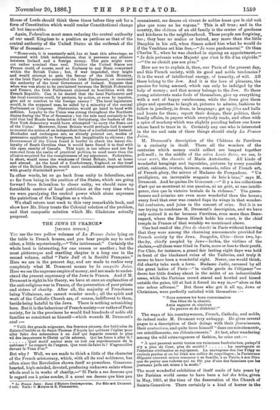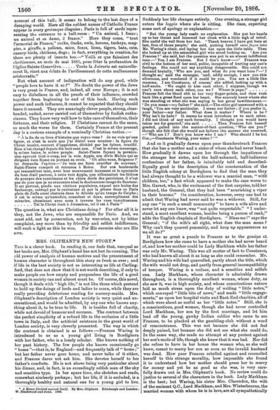You see the two yellow volumes of La France Juice
lying on the table in French houses, and you hear people say to each other, a little mysteriously,—" Tres interessant." Certainly the whole book is interesting, for one reason or another ; but the most picturesque and startling chapter is a long one in the second volume, called " Paris Jnif et la Societe Francaise." Here we are in the present day, and are made to realise very completely what M. Drnmont means by in conquete Juice. Here we see the supreme empire of money, and are made to under- stand the present supremacy of the Jews in France. And if M. Dramont is right in his theory, we have at once an explanation of the anti-religions war in France, of the persecution of poor priests and sisters of charity. After all, the majority of Frenchmen being Voltairean, one cannot wonder much ; all the spirit and work of the Catholic Church are, of course, indifferent to them, beside being hateful to the Jews. There is nothing astonishing here. But it is the behaviour of French society—or rather of Paris -society, for in the provinces he would find hundreds of noble old families as consistent as himself—which wounds M. Drumont's soul :- " Voila des grands seigneurs, des femmes pieuses, des habitudes de Sainte-Clotilde et de Saint-Thomas d'Aquin qui quittent Peglise pour -alter faire des salamalecs an Jail qui regards comme le plus Nil des impostenre le Christ qu'ils odorant. Qui les force a tiller la ? Quel motif amen eons ce toit oes repriSeentants de la noblesse ? Le respect de l'argent. Qat, vont-ils faire la ? S'agenoniller devant le Mean d'or."
But why ? Well, we are made to think a little of the character of the French aristocracy, which, with all its real nobleness, has often since the Revolution shown itself so powerless. Generous- hearted, high-minded, devoted, producing unknown saints whose Whole soul is in works of charity,—" Si Paris a see dessons qne le regard ose ii. pain sonde; it a aussi see damns qua Bien pea
• La Frame Adv.: Rasa d'Histaira Oeateaporaise. Par Rderard Eramout. 2 vols. Paris: C. Xarpon et E. Flammarion.
oonnaissent, ces dessus oil vivent de nobles limes qne le ciel voit - plus quo none ne lee voyons." This is all true ; and in the country, the chdteau of an old family is the centre of goodness and kindness to the neighbourhood. These people are forgiving, too ; they bear no malice or hatred, any more than the little Dauphin in his cell, when Simon asked him what he would do if the Vendeans set him free,—" Je vows pardonnerai." Or than Charles X., when he was checked in signing an appointment,— " Je dois prevenir votre Majeste qua c'est le file d'un regicide." —" On ne choisit pas son pare."
How are we to explain it, then, our Paris of the present day, and this French society, with its good and noble tendencies P It is the want of intellectual energy, of tenacity, of will. All these belong to the Jew. And it is the love of pleasure, the passion for being amused, which can only be indulged by the help of money; and that money belongs to the Jew. So these young aristocrats make fools of themselves, give up everything with a sort of happy carelessness, while the Jews give them plays and operettas to laugh at, pictures to admire, fashions to follow in jewellery, in dress, in language ; get up fines and balls and hunts for them ; report their doings, their politics, their family affairs, in papers which everybody reads, and often with a spice of mockery which was slightly puzzling before one knew whose hand to trace in it. Certainly any one who is interested in the ins and oats of these things should study La France Juice.
M. Drumont's description of the Chateau de Ferrieres is a curiosity in itself. There all the wonders of the centuries which money could collect are heaped together pell-mell ; in the middle of the salon Louis Seize, we see, is cceur serrg, the clavecin of Marie Antoinette. All kinds of wonderful hangings and tapestries, pictures by every possible artist, cabinets, ivories, faiences, enamels, relies of French art, of French glory, the mirror of Madame de Pompadour. " Un prodigienx, nu incroyable magasin de brio-a-brac," says M. Drnmont. And he quotes De Goncourt :—" Il y a des collections d'art qui ne montrent ni une passion, ni nu goilt, ni une intelli- gence, rien qua la viotoire brntale de Is richeese." The green- houses and aviaries are even more wonderful than the house ; every fowl that ever was created flaps its wings in that wonder- ful confusion, and joins in the concert of cries. But it is no use trying to condense M. Drnmont's description, and we have only noticed it so far because Ferrara, even more than Bean- regard, where the Baron Hirsch holds his court, is the chief temple in France of that worship we mentioned above.
One had read of the fates de charity in Paris without knowing that they were among the charming amusements provided for French society by the Jews. Szegedin, Chio—these two, by- the-by, chiefly peopled by Jews—Ischia, the victims of the cholera,—all these were feted in Paris, more or less to their profit. For Ohio, for instance, a grand fair lasting eight days was held in front of the blackened ruins of the Tuileries, and truly it seems to have been a wonderful sight. Never, one would think, did charity take such a form. Madame Judie, caressed by all the great ladies of Paris—" la vieille garde de l'elegance "—• drove her little donkey about in the midst of an indescribable scene, while the Parisian crowd stared and howled and hissed outside the gates, till at last it forced its way in,—" alore ce fat une eohne affrease." But those who got it all up, Jews or Christians, were perfectly satisfied with themselves :- " Nous sommes les bons commissaires Dee Mee de la charit,l, Amis sagaces et sinceres Da pauvre et du ddsh6rit6 !"
The ways of his countrywomen, French, Catholic, and noble, do indeed make M. Drumont very unhappy. He gives several pages to a description of their doings with their fournisseurs. their couturieres, and quite loses himself " dans ces miroitemente, ces scintillements, ces eblonissements." At last, after wandering among the wild extravagances of fashion, he cries out :— " A quoi peuvent servir touter ces ruinenses faufraluches, puisqu'il n'y a plus de Coar, plus de societe ? La esavagerie at l'extrome civilisation se rejoignent. La sauvagesse des lies Fidgy se croirait perdue si on lui otait son collier de coquillages ; is Parisienne 616gante aimerait mieux renoncer a sa famine, a ea Petrie, 1 son Dieu qne de porter une toilette qui ne flit pas d'une des faisenses qua les journaux juife out mimes a Is mode."
The moat wonderful exhibition of itself made of late years by the Parisian world seems to have been a Cal des Mee, given
in May, at the time of the desecration of the Church of Sainte-Genevieve. There _certainly is a kind of horror in tho
account of this tall ; it seems to belong to the last days of a decaying world. Here all the noblest names of Catholic France appear in every grotesque disguise; Paris is full of cards repre- senting the entrance to a ball-room : " Un animal, 1 franc ; un animal et sa dame, 2 francs." Here they come, " tont l'armorial de France," cocks, ducks, owls, herons, turkeys, mag- pies, a giraffe, a pelican, mice, foxes, lions, tigers, bats, cats, canary.birds, chickens, dogs ; in fact, everything in creation, for
there are plenty of insects too.—" Voila ce que faisaient des chretiennes, an mois de mai 1885, pour fiter la profanation de
l'eglise Sainte-Genevieve Toute la Juiverie est naturelle-
meat la, riant aux &lets de l'avilissement de cette malheureuse
aristocratie."
But what amount of indignation will do any good, while " people love to have it so ?" No doubt the power of the Jews is very great in France, and, indeed, all over Europe ; it is not easy to disbelieve in all the proofs of their influence, crowded together from beginning to end of this book. Having such power and such influence, it cannot be expected that they should leave it unused. They are amazingly clever people, strong, clear- headed, united, never carried out of themselves by foolish enthu- siasms. They know very well how to take care of themselves, their fortunes, and their religion. If Christians cannot do the same, so much the worse for them. Certainly France at the present day is a curious example of a nominally Christian nation :—
" A la fin de ce livre d'histoire quo voyez-eons Je ne vois qu'une figure, et c'eet Is senle que j'ai desire vous montrer : la figure du Christ instate, convert d'opprobres, dechire par les spines, crucifie. Rien n'est change depuis dix-hnit cent ans. C'est le mime mensonge, Ia mime haine, le mime peuple. Saint-Pierre fuyant la persecu- tion apercut tout-a-coup, Bur la voie Appia, son divin Maitre qui se dirigeait vere Rome en portant sa croix. ' Oh allez-vons, Seigneur ?' lui demands, l'apetre.-4 Je vale me faire crucifier de nouveau.' Saint•Pierre comprit et retourna a Rome. Sur nos boulevards qui ressemb'ent tent, avec leur monvement incessant et le spectacle du luxe stale partout, a cette voie Appia, que sillonnaient lea litieres de pourpre des courtisanes et lea chars dores des patriciens, it n'est pas de jour que je ne rencontre ainsi la douloureuse image du Sauveur. Il est partout, pencia aux vitrines populaires, exposé aux huees des faubourge, outrage par Ia caricature et par la plume dans ce Paris plein de Juifs aussi obstines dane le deicide qu'au temps do Calphe ; it est le mime qu'autrefois, consolant et dour, accomplissant des miracles, cheminant avec none h travere lee rues tumultuenses.
Tel le Christ etait a Jerusalem, tel it est a Paris "
The question is, what are Christians doing ? For after all it is they, not the Jews, who are responsible for Paris. And, we must add, not by persecution, not by war-cries, not by bitter complaint, any more than by frivolity and selfish indifference, will such a fight as this be won. For His enemies also are His
Own.



































 Previous page
Previous page